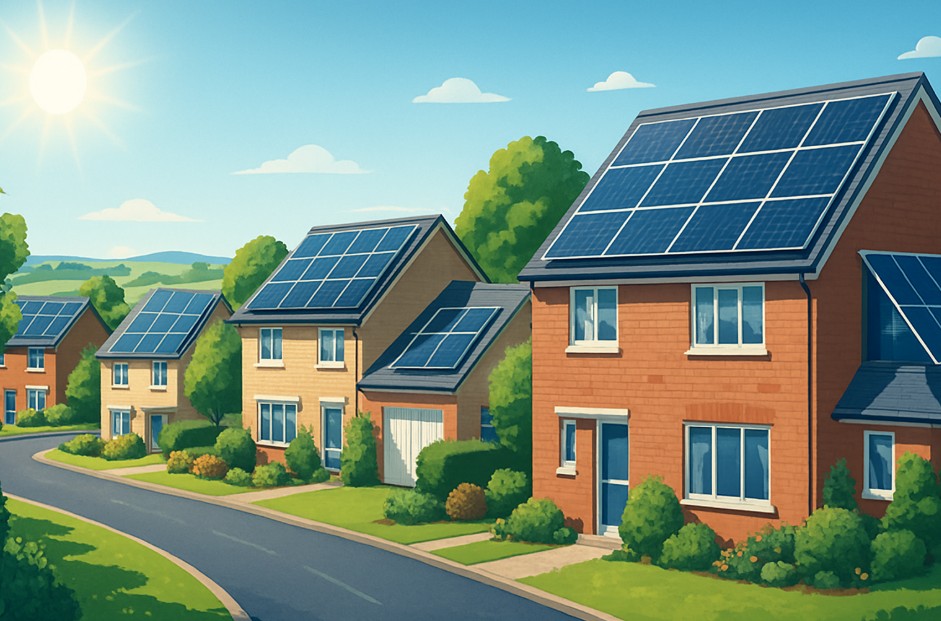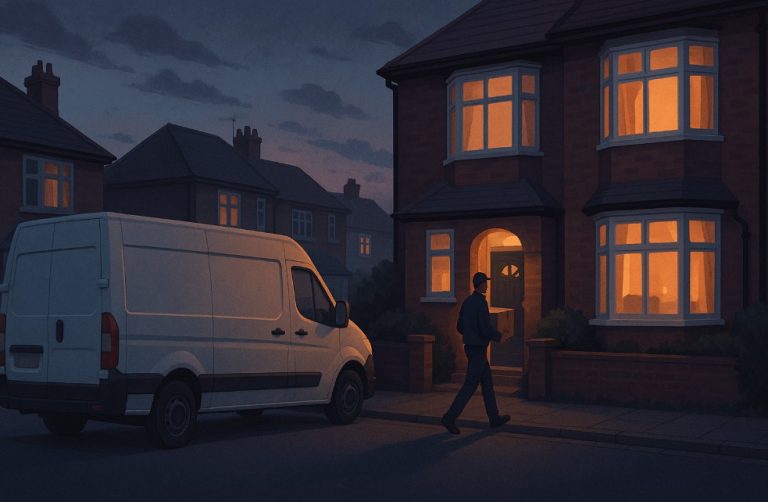Government Grants for Solar Panels UK: What Support Is Available in 2025?
Are Solar Panel Grants in the UK Still Worth Exploring in 2025?
In 2025, the UK is continuing its journey toward a low-carbon economy, and solar energy remains at the heart of its sustainable energy strategy.
More than 180,000 households installed solar panels in 2024, a significant rise attributed to a combination of rising energy costs, growing climate awareness, and an expanding list of government incentives.
The UK government has implemented a variety of schemes and grant programmes designed to reduce the financial burden of installing solar panels.
These schemes are structured to support different types of households, including low-income families, social housing residents, renters, and even homeowners in wealthier brackets who want to improve energy efficiency.
The question many homeowners ask is: Which solar panel grants are available, and how much can you actually save in 2025?
This guide explores the current government schemes, regional grants, financial incentives, and eligibility criteria to help you make a well-informed decision about adopting solar power.
What Are the Main Government Grants for Solar Panels in the UK?
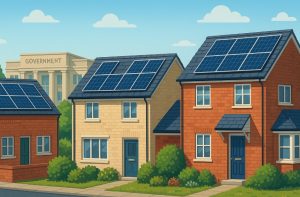
As of May 2025, the UK government provides multiple avenues for homeowners to access support for solar panel installations.
These include full or partial funding schemes, tax incentives, and income-generating programmes. Each scheme has specific conditions, eligibility criteria, and benefits.
Overview of Available Solar Panel Funding in the UK – May 2025
| Scheme | Active Period | Funding Offered | Eligible Households |
| ECO4 | 2022 – 2026 | Up to 100% funding | Low-income households, benefits recipients |
| Warm Homes Plan | 2025 – 2028 | Up to £30,000 | Low-income households, renters, and social housing |
| Smart Export Guarantee (SEG) | 2020 – ongoing | Up to £170/year | All solar panel owners |
| 0% VAT | 2022 – 2027 | Save £1,500–£4,100 | All UK buyers |
| Solar Together | Regional | Up to 40% savings | Homeowners in participating councils |
| Warm Homes Nest (Wales) | Indefinite | Full funding | Low-income or medically vulnerable households |
| Home Energy Scotland | Varies | Loans up to £5,000 | Scottish residents (solar thermal only) |
How Does the ECO4 Scheme Support Solar Panel Installations?
The Energy Company Obligation 4 (ECO4) scheme is one of the most significant government initiatives for home energy upgrades in the UK.
It is designed to help improve energy efficiency and reduce carbon emissions by funding improvements such as insulation, heating systems, and, importantly, solar panels.
Key Features of ECO4
ECO4 offers up to 100% coverage for solar panel installation, depending on eligibility. Administered by Ofgem and delivered through large energy suppliers, the scheme has already supported nearly 30,000 solar installations as of late 2024.
Eligibility is determined primarily by household income, EPC rating, and benefit status. Those not receiving benefits may still qualify through LA Flex, a local authority-led assessment route.
Eligibility Criteria for ECO4
- Household income under £31,000
- Receipt of means-tested benefits (e.g. Universal Credit, Housing Benefit)
- EPC rating below band D
- Residents of England, Scotland, or Wales (not available in Northern Ireland)
Additional flexibility is granted through LA Flex, allowing councils to include people with health conditions or other vulnerabilities.
Grant Coverage and Value
The ECO4 grant can provide substantial support. In some complex cases, it has funded multiple upgrades, including full insulation, heating systems, and solar PV, sometimes exceeding £80,000 in total value.
Payments go directly to the installers, removing the need for upfront costs from the homeowner.
What Is the Warm Homes Plan and Who Can Benefit?

Launched in April 2025, the Warm Homes Plan is a new initiative under the Labour government aimed at tackling fuel poverty and promoting renewable energy adoption in disadvantaged communities.
Unlike ECO4, which primarily targets benefit claimants, the Warm Homes Plan takes a broader approach, offering grants of up to £30,000 for home energy improvements, including solar installations. The funding is available across England and Wales.
Eligibility Requirements
The scheme is available to:
- Social housing residents
- Renters with landlord consent
- Low-income households earning under £31,000
- Households receiving Universal Credit or similar benefits
A retrofit assessment is required to evaluate the property’s energy efficiency needs. Based on this assessment, a package of improvements, including solar PV systems, may be approved for funding.
How Much Can You Save with 0% VAT on Solar Panels?
The UK government’s decision to apply 0% VAT on solar panels, batteries, and installation services until March 2027 has made solar more affordable for all homeowners.
The savings are automatically applied at the point of sale if the installer is VAT registered and the installation meets qualifying criteria.
Average Cost Savings with 0% VAT (Based on System Size)
| System Size | Total Savings vs. 20% VAT |
| 3kW | £1,500 – £2,300 |
| 4kW | £2,600 – £3,100 |
| 5kW | £3,300 – £3,700 |
| 6kW | £3,900 – £4,100 |
Combined with other grants or SEG, the VAT relief drastically reduces the payback period for solar systems, from a typical 20 years to as low as 15.
How Does the Smart Export Guarantee (SEG) Help You Earn?
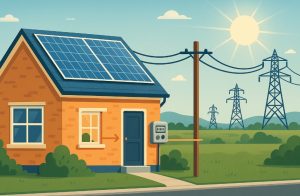
The Smart Export Guarantee is not a grant but a government-mandated programme that requires major energy suppliers to pay homeowners for the excess solar electricity they export to the grid.
Introduced in 2020, SEG is ideal for any homeowner with an MCS-certified solar system and a smart meter.
SEG Impact on Annual Savings
| System Size | Base Savings | SEG Earnings | Total Yearly Savings |
| 3kW | £450 | £80 | £530 |
| 4kW | £670 | £170 | £840 |
| 6kW | £1,020 | £200 | £1,220 |
You can shop around for the best SEG tariff, and many suppliers allow you to benefit from export payments even if they’re not your main energy provider.
What Regional Grants Are Available in Scotland, Wales, and Northern Ireland?
Wales: Warm Homes Nest Scheme
The Nest scheme offers full funding for energy upgrades, including solar panels, to low-income or medically vulnerable households.
Eligibility includes:
- Owning or privately renting your home
- Receiving a means-tested benefit or suffering from a chronic health condition
- EPC rating of E or below
Applications can be submitted via the Welsh Government Nest helpline.
Scotland: Home Energy Scotland
As of mid-2024, Home Energy Scotland no longer offers grants for standard solar PV systems. However, Scottish residents can apply for:
- Interest-free loans up to £5,000 for solar thermal or hybrid solar PV/water heating systems
- An uplift for off-grid homes and those in rural or island areas
The scheme requires affordability and credit checks, and repayment terms are typically up to 5 years.
Northern Ireland
There are currently no government-funded solar panel grant schemes available in Northern Ireland. Homeowners may still benefit from the 0% VAT relief and SEG.
How Does Solar Together Work as an Alternative to Grants?
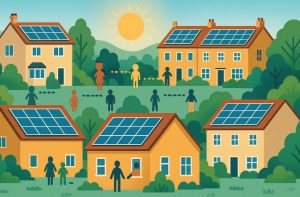
Solar Together is a group-buying scheme that reduces installation costs by pooling demand from homeowners in the same region. Installers bid in a reverse auction, leading to lower prices for participants.
Benefits of the Scheme
- Up to 40% savings on installation costs
- Vetted installers ensure quality
- Available to homeowners and renters with permission
Current Status
In 2024, 28% of surveyed solar adopters used Solar Together. The scheme continues to expand into more local authorities across the UK.
What Is the Real Cost of Solar Panels After Grants?
Let’s look at how much a solar installation actually costs in 2025 with available government support.
Estimated Cost and Savings Table (May 2025)
| Property Size | System Size | Typical Cost (with Battery) | Annual Savings (Incl. SEG) | Break-Even Period | 25-Year Savings |
| 1–2 bedrooms | 2kW | £3,000–£4,000 | £485 | 6 years | £12,125 |
| 2–3 bedrooms | 4kW | £5,000–£6,000 | £730 | 5 years | £18,250 |
| 4–5 bedrooms | 6kW | £9,500–£10,500 | £1,110 | 8 years | £27,750 |
These estimates assume an SEG tariff of 10.8p per kWh and typical UK electricity usage.
What If You’re Not Eligible for a Grant?
Even without government funding, you still have options:
- Green mortgages offer cashback or lower rates for energy-efficient homes
- Solar loans spread the cost over time
- Subscription plans like those from Sunsave and Otovo allow you to lease solar panels with no upfront payment
These alternatives provide flexibility and access to solar technology for a wider audience.
What Solar Funding Options Are Most Popular?
A 2024 survey of over 2,000 UK solar owners revealed the following usage rates of funding schemes:
| Scheme | Popularity Among Respondents |
| Solar Together | 28% |
| Warm Homes Nest | 18% |
| Home Energy Scotland | 16% |
| ECO4 / LA Flex | 16% |
| HUG2 | 14% |
| No funding used | 8% |
The trend shows that bulk-buying and local authority-driven grants are the most effective and accessible for many households.
Frequently Asked Questions
Can renters apply for solar panel grants in the UK?
Yes, with landlord permission, renters can qualify under schemes like ECO4, Warm Homes Plan, and Solar Together.
What’s the difference between ECO4 and LA Flex?
ECO4 has national criteria; LA Flex allows councils to include additional households based on local needs.
Can you get fully funded solar panels in 2025?
Yes, ECO4 and Warm Homes Nest can cover 100% of the installation cost for eligible applicants.
How long does it take to apply and get approved?
Typically 2 to 8 weeks, depending on your supplier, location, and scheme.
What is Solar Together?
A group-buying scheme offering discounts (up to 40%) on solar panel installation through competitive bidding.
Can I combine SEG and VAT relief with grants?
Yes, SEG payments and 0% VAT can be used alongside most grant schemes.
Are solar grants taxable?
No, government solar grants are not considered taxable income in the UK.

